「マイクロスクール」とは
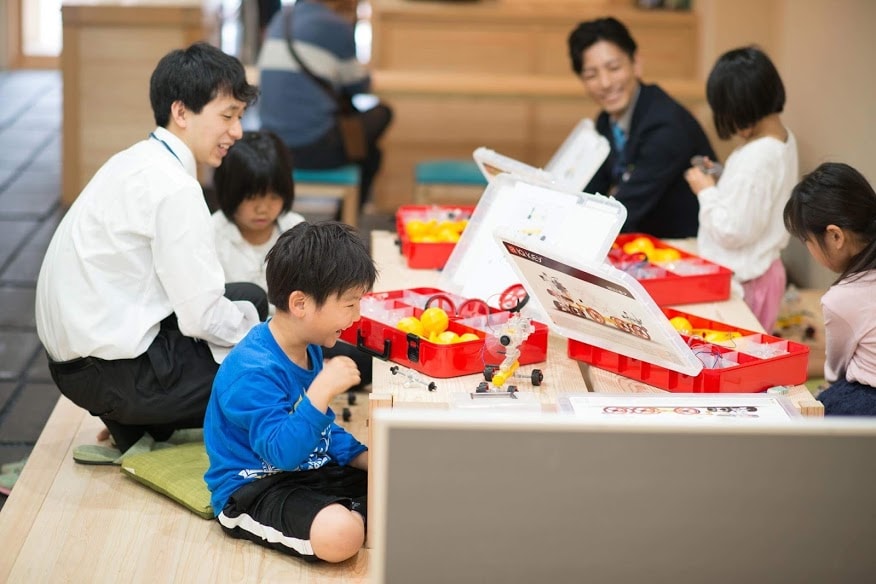
これからの時代を生きる子どもたちのために、イデアスポットでは「マイクロスクール」という新たな教育の形を提供しています。学校や学習塾、習い事など、従来の概念とは異なる教育の姿をご紹介します。
Idea Spot is introducing a new form of education, "micro school," to support children who will live in the coming era, by offering an innovative way of education, which is different from those of traditional schools, cram schools or private culture lessons.
「マイクロスクール」とは
What is "micro school"?
「マイクロスクール 」とは、徹底した少人数制にテクノロジーを組み合わせることで、一人ひとりの子どもに高度に個別化された教育を提供する、世界基準の新たな教育システムです。
マイクロスクールの先進地域であるアメリカにおいては
- 2009年にテキサス州で開校した世界初のマイクロスクール ”Acton Academy”
- 元Googleのエンジニアであるマックス・ヴェンティラが創設し、マーク・ザッカーバーグ夫妻をはじめとした世界の投資家・テクノロジストが出資する”Alt School”
- 「誰もがどこでも無料の授業を」を合言葉に無料かつ良質な講義をインタネット上で配信するNPOカーンアカデミーが開校した”Kahn Lab School”
- 世界初のカトリック系マイクロスクールとして誕生した”Parish Academy”
など、世界では次々と新たなマイクロスクールが生まれており、教育界の新たなムーブメントとして広く注目されています。
Micro school is a new education system which, with advanced technology and small-group classes, provides education highly individually customized to each student.
In the United States, where micro schools have become already common, there are such examples as follow;
- Acton Academy: the world's first micro school that opened in Texas in 2009
- AltSchool: founded by Max Ventilla, a former Google engineer, and funded by globally renowned investors and technologists including Mark and Priscilla Zuckerberg
- Khan Lab School: founded by the NPO Khan Academy, which delivers free high quality lectures on the Internet, with its slogan: " A Free World-Class Education for Anyone, Anywhere"
- Parish Academy: the world's first Catholic micro school
Micro schools are popping up one after another all over the world and are viewed as notable movement in education.
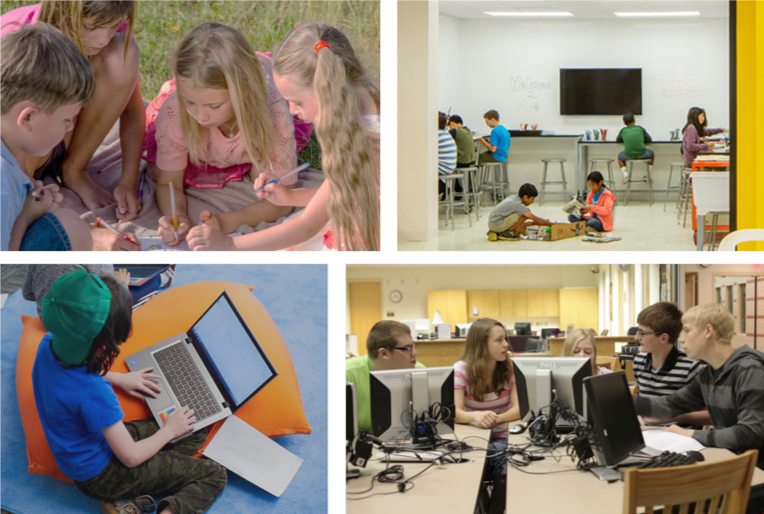
イデアスポット京都校は、日本の私教育におけるマイクロスクールの先駆けとして、難関指導に特化した、徹底した個別化教育を提供しています。
Idea Spot Kyoto, as a pioneer of micro schools in Japan, is offering education programs individually customized to students trying to pass difficult entrance exams for top schools.
なぜいま日本で
「マイクロスクール」なのか
Why a "micro school"
here in Japan now?
昭和・平成を振り返ると、急速な経済成長を実現するためには、社会のみんなが高度な知識をより多く身につけることが重視されてきました。教育者はより多くの知識を詰め込んだ教材を作り、学習者は時間をかけて暗記する。その結果、確かに日本の教育水準は短い期間で飛躍的に向上し、国力を高めることに繋がりました。
しかし、その後のテクノロジーの進歩によって、誰もが容易に情報にアクセスできるようになり、教育における知識そのものの価値は相対的に小さくなりました。
令和という新時代に教育機関に求められるのは、高い学習効率、すなわち、短い時間で効率よく学習できる環境を提供することです。一人ひとりの子どもの違いに合わせて「いま、何を、どの様に学ぶべきか?」という学習プロセスを最適化し、結果、自分の頭で答えを出せる力を、圧倒的に短い時間で自分のものにする。受験の成功といった進学で結果を出すことは当然のことですが、その先に社会で活躍することも見据えて、子どもの学習プロセス全体を学習効率の観点からコーディネートできることが必要です。
Looking back on the Showa and Heisei era, in order to realize rapid economic growth, it had been thought important that everyone in society gets as much knowledge as possible. Educators had focused on making knowledge-packed study materials and learners spent much time to memorize them. As a result, the academic standards in Japan did dramatically improve in a short period of time, which led to an increase in national power.
Today, however, with advanced information technology, the value of knowledge in education has relatively declined as everyone now has easier access to information thanks to the Internet.
What should educational institutions focus on in the new era of Reiwa, then? We think it’s to provide an environment where students can learn with high efficiency. We optimize learning process of “what and how to learn now” according to characteristics of each child, and as a result, in a quite short time, children will learn how to think of a solution themselves. We will coordinate the whole learning process of each student, taking into account their future careers, besides the immediate target of passing entrance examinations.
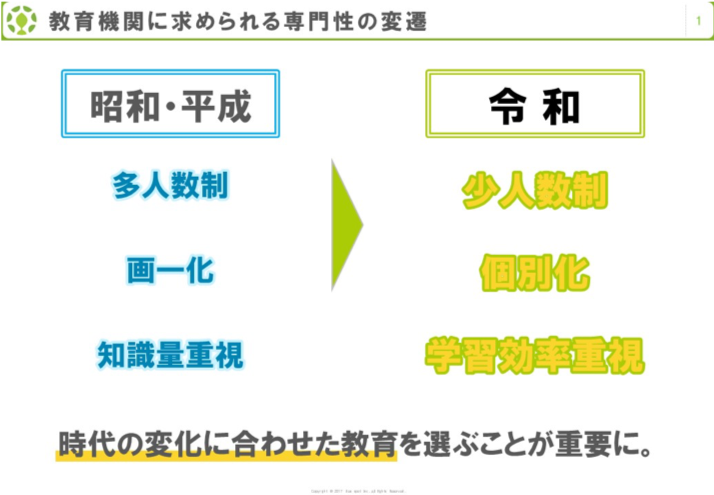
- 一人ひとりの特性や能力、学習上の理解度をしっかりと把握して、提案する
- 時代の変化を読み解き、学ぶべき内容を常に取捨選択して、提供する
この両方の専門性を発揮することで、高度に個別化された教育を提案・提供するのが、日本のマイクロスクールの目指すところです。
Micro schools in Japan aim to suggest and offer highly individually customized education. And to realize this, our purposes are as follow;
- We make proposals based on what characteristic and ability each student has or to what degree they understand in learning
- We choose carefully what we should teach, taking into account the shifts of the times
「マイクロスクール」
の3つの特徴
Three features of
“micro schools”
マイクロスクールの教育には、以下の3つの特徴があります。
Micro school education has the following three features.
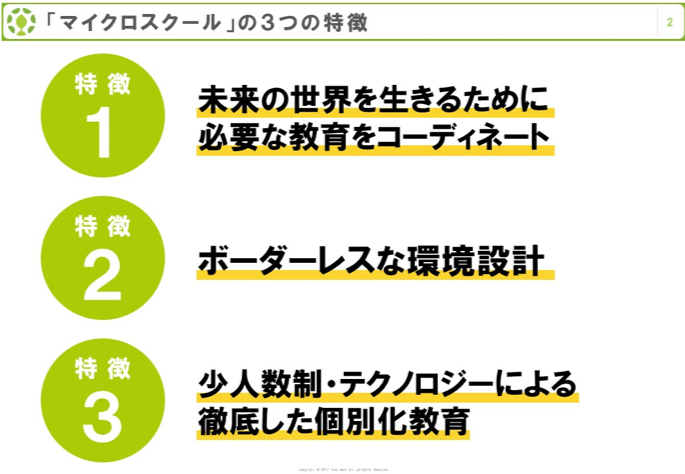
一つずつその詳細を見ていきましょう。
①未来の世界を生きるために必要な教育をコーディネート
今の子ども達には、自分達が経験した古風な教育を受けさせるだけではなく、未来の世界を生きるために必要な教育を受けさせることが必要です。ラーニングガイド(Learning Guide)が生徒一人ひとりの特性や学びのスタイルを把握し、それぞれに適切な教育内容をコーディネートします。
②ボーダーレスな環境設計
マイクロスクールは従来の教育システムとは根本的に異なるため、環境設計にも大きな違いが見られます。2020年教育改革により様変わりする教育内容を、親御さんと直接指導する講師が共有しながら進められるよう、コミュニケーションが生まれやすい環境設計がされています。自然な連携から生まれる教育は高い学習効果を発揮します。
③少人数制・テクノロジーによる徹底した個別化教育
情報環境が変わり「人工知能が人間の仕事を奪う」とすら言われる現在においても、学びの責任を担うのは人間の役割です。少人数制を徹底することで、プロが責任を持って質の高い教育を提供します。また、一人ひとりの学習状況をデータ分析することはもちろん、データベースやAIといったテクノロジーを活用し、遥かに高い効率の個別化教育を提供します。
Let's look at the details of each.
1. To offer lessons where students can learn how to live in the future world
We think it necessary for the youth of today to receive not the old-fashioned education that our generation had got but one that will enable them to live through the future world. Learning Guide will help understand each student's characteristics and learning styles, and coordinate the appropriate educational contents for each.
2. Smooth communication between parents and teachers
Since micro schools are fundamentally different from conventional education systems, there are significant differences in environmental designs too. The environment is designed so that parents and teachers can smoothly communicate with each other and foster better understanding of the changes that the educational reform in 2020 will bring. Smooth communication and cooperation between parents and teachers will lead to highly efficient education.
3. Highly individually customized education based on advanced technology and small- group classes
With advanced information technology, they say artificial intelligence could soon take jobs away from humans. Nevertheless, it is still the human role to take on the responsibility of education. With small-group classes, our professional teachers are committed to provide high quality education. In addition to data analysis of each student's learning progress, we utilize technologies such as databases and AI to provide much more efficient education than ever.
デジタルリテラシーを
高めるために
To develop digital literacy
これからの時代の変化に適応し、より多くの学習機会を有効活用するためには、デジタル領域のリテラシー「DQ(デジタルインテリジェンス)」を早期に高めておくことが必要です。
「DQ」とは、OECDの全世界規模のプロジェクト「Education 2030」(2030年という近未来において子ども達に求められるコンピテンシーを検討するとともに,そうしたコンピテンシーの育成につながるカリキュラムや教授法,学習評価などについて検討している)においても取り上げられる、情報リテラシー / 情報モラル / デジタルスキルにおける新しいグローバル基準です。
In order to adapt to the coming age and to make effective use of more learning opportunities, it is indispensable for children to develop their digital literacy, or “DQ (digital intelligence)” at an early stage.
"DQ" is a new global standard in information literacy, information morals and digital skills. It is refereed in OECD's global project “Education 2030,” which examines the competencies required of children in the near future, as well as curricula, teaching methods and learning evaluations that could lead to the development of such competencies.
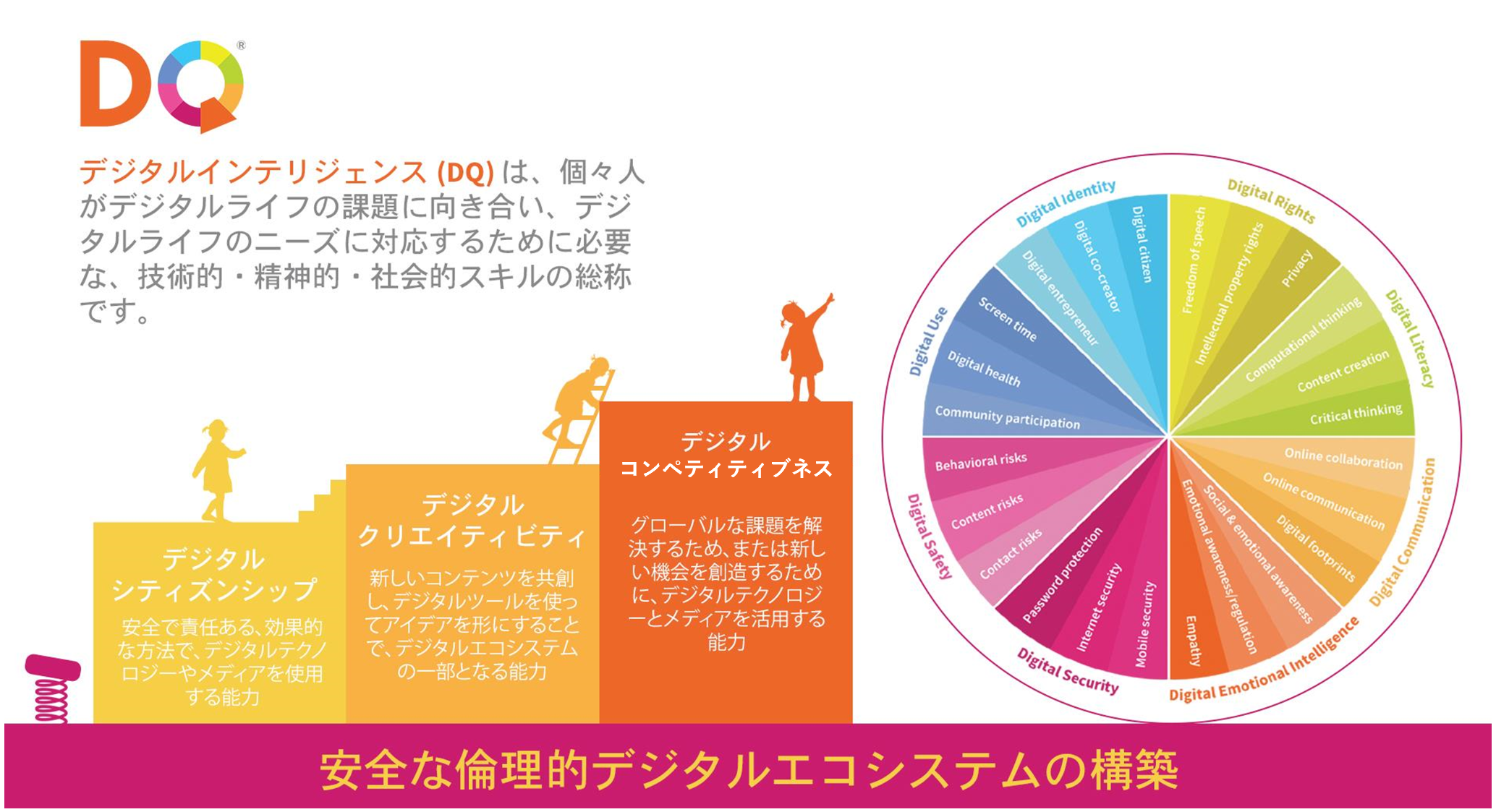
幼少期からデジタルリテラシーを体系的に習得できる機会はなかなかありませんが、イデアスポット京都校は国内の教育機関の先駆けとして、日本のマイクロスクールで初めてDQ教育を取り入れています。
※参考
DQとは? https://cyber-felix.com/
DQ Institute (ENGLISH) https://www.dqinstitute.org/
Though there are still few opportunities to systematically acquire digital literacy from an early age in Japan, Idea Spot Kyoto is the first to adopt DQ education of the micro schools in Japan.
※References
What is DQ? https://cyber-felix.com/
DQ Institute (ENGLISH) https://www.dqinstitute.org/